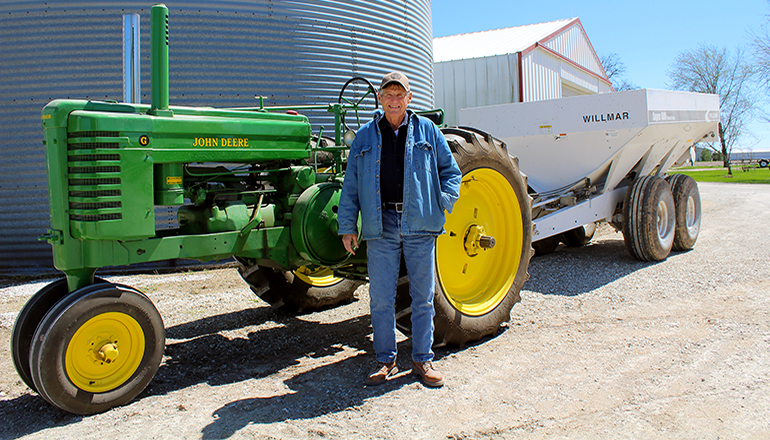Missouri Soybean Hall of Fame 2019 inductee Gary Riedel says demand for soybean increased greatly since farmers approved checkoff dollars to fund research and promotion.
Riedel served as head of Missouri Soybean Association in the early 1980s and was president of the American Soybean Association when the national soybean checkoff went into effect.
This year, the row crop farmer plants his 51st crop of the bean that “sustains a lot of undernourished people in the world with protein.” Riedel’s 2,300-acre farm straddles the Audrain-Boone county line south of Centralia. Riedel is the third recipient of the award and follows the posthumous inductions of George Washington Carver and “Mr. Soybean” Don Heil.
Bill Wiebold, director of the Missouri Soybean Center and University of Missouri Extension soybean specialist, presented the award April 10 at the U.S. Soybean Symposium in Columbia. Wiebold cited Riedel’s critical role in farmer approval of the soybean checkoff.
Riedel joined Missouri Soybean Association in 1970, four years after it formed. He and then-MSA President Jim Hughes co-signed a bank note to finance the process of putting a Missouri checkoff in place. The MSA incorporated the Missouri Soybean Merchandising Council in 1980 during Riedel’s tenure.
During his 1991-92 term as American Soybean Association president, the Soybean Promotion and Research Campaign went into effect due to the checkoff provision in the 1990 farm bill. Board members allocated many of the checkoff dollars to expand markets, including those in China, a major importer of U.S. soybean. “I don’t know how much any of our efforts had to do with that, but I know it helped finance the process – getting people to think a little further ahead and getting people to understand what could be possible in the future,” Riedel says.
Wiebold says Riedel’s “level-headed” approach helped the boards of the American Soybean Association and United Soybean Association come together. He served as vice president of domestic marketing and vice president of international marketing during part of his 11 years on the ASA board.
As chairman of the Soybean Industry Vision Committee in 1993, Riedel and others set a goal for soybean producers to grow 3 billion bushels of soybean per year with a price of $8 per bushel by the early 21st century. By the next decade, farmers grew 3 billion bushels. Soybeans hit $8 per bushel in 2003, and in 2007 the average price was $8 for the year. Riedel says today soybean producers grow 4 billion bushels at an average of $8-plus per bushel even with the current tariffs.
Riedel also worked to open new markets for soybean oil as an original board member of Mid-America Biofuels of Mexico, Mo. The company is a partnership of industry and farmers. He continues to serve on the board. He also serves on the advisory board of MU’s Bradford Research Center. He received a degree in agronomy from MU in 1966 and served in the U.S. Army following graduation.
At his farm near Centralia, Riedel rotates soybeans and corn annually and double-crop soybeans after wheat. He no-till drills soybeans into cornstalk residue. His soybeans averaged 63.8 bushels per acre last year. He had 135 acres that produced 72 bushels per acre. Corn averaged 212 bushels to the acre in 2017.
He manages the farm—still participating in the planting, hauling, equipment maintenance, harvesting and much of the spraying—alongside his cousin and son-in-law. “I don’t want to be run by my farm. I want to run it,” he says. Regarding soybeans, Riedel says, “I just grow them today, which I enjoy doing.”







